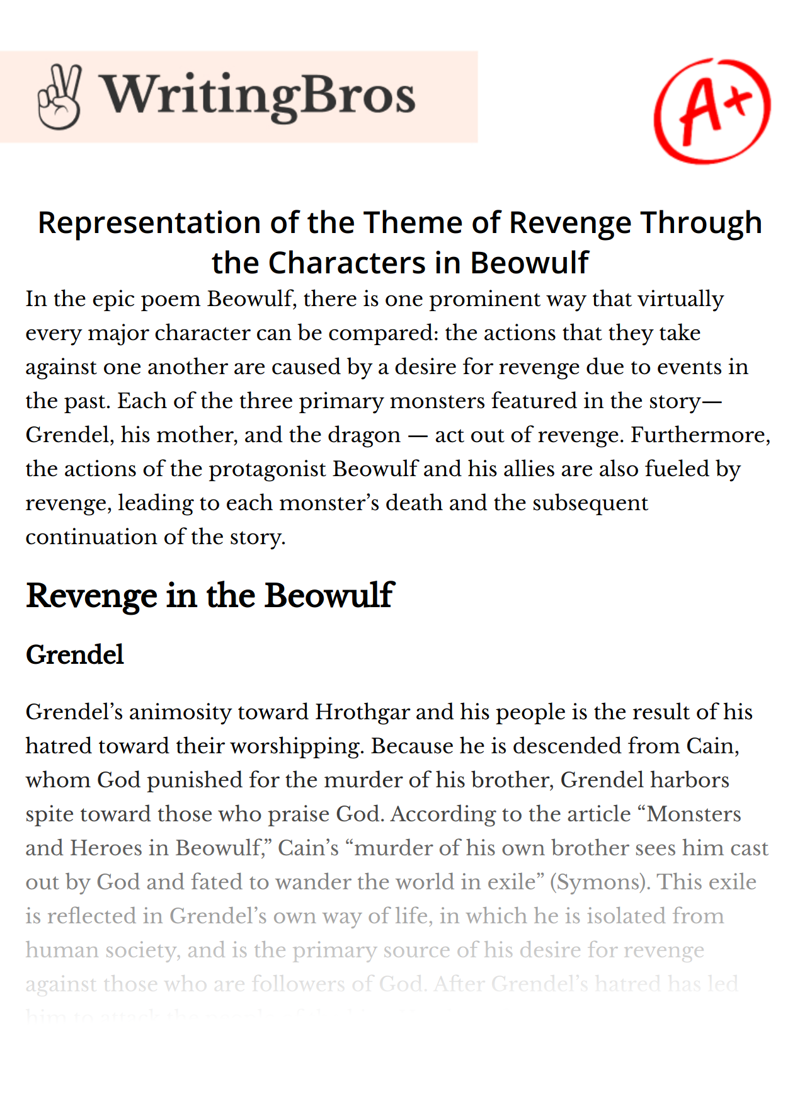Representation of the Theme of Revenge Through the Characters in Beowulf

Table of contents
In the epic poem Beowulf, there is one prominent way that virtually every major character can be compared: the actions that they take against one another are caused by a desire for revenge due to events in the past. Each of the three primary monsters featured in the story—Grendel, his mother, and the dragon — act out of revenge. Furthermore, the actions of the protagonist Beowulf and his allies are also fueled by revenge, leading to each monster’s death and the subsequent continuation of the story.
Revenge in the Beowulf
Grendel
Grendel’s animosity toward Hrothgar and his people is the result of his hatred toward their worshipping. Because he is descended from Cain, whom God punished for the murder of his brother, Grendel harbors spite toward those who praise God. According to the article “Monsters and Heroes in Beowulf,” Cain’s “murder of his own brother sees him cast out by God and fated to wander the world in exile” (Symons). This exile is reflected in Grendel’s own way of life, in which he is isolated from human society, and is the primary source of his desire for revenge against those who are followers of God. After Grendel’s hatred has led him to attack the people of the king Hrothgar for many years, Beowulf comes to aid the people in need. Holt McDougal’s telling of Beowulf explains that Beowulf “Heard how Grendel filled nights with horror and quickly commanded a boat filled out, proclaiming that he’d go to that famous king … now when help was needed” (112-116). Hrothgar seeks revenge for what Grendel has done, and as a result, Beowulf does as well. Upon arriving, the combined desires of Hrothgar and Beowulf to have revenge against Grendel lead to the monster’s death at Beowulf’s hand.
Grendel’s mother
Grendel’s mother is also motivated by a desire for revenge, in this case for her son. This leads her to attack Hrothgar’s people, just as her son had. When she arrives at Herot, it is explained that she “took a single victim and fled from the hall” (411). Unlike in Grendel’s slaughters, she targets just one person close to Hrothgar, as she wants him to feel her pain. Her emotions are most likely stronger than Grendel’s, as the actions of Beowulf and Hrothgar’s people have had a more direct impact on her life, and her resulting hunger for revenge may have caused her to act in a more calculated manner than her son had. Nevertheless, the attacks of both monsters, although different in nature, have the same root cause. As he had with Grendel, Beowulf seeks revenge for Grendel’s mother’s strike against Hrothgar’s people, traveling alone into her underwater dwelling to confront her. The article “Monsters and Heroes in Beowulf” states that Grendel’s mother chooses to kill “Hrothgar’s closest advisor, in a tit-for-tat killing that’s meant to match the loss of her only son” (Symons). Also as it had been with Grendel, Beowulf’s desire for revenge is linked with Hrothgar’s, as the king was the one who had truly been affected by the attacks. Grendel’s mother is then killed, just as her son had been, due to Beowulf and Hrothgar’s lust for revenge.
The dragon
Lastly, the dragon attacks Beowulf’s people out of revenge; specifically, it seeks revenge for an item stolen by a human from its horde, as this cup happens to be the dragon’s favorite of all that it had. Because of its greed, it seems to take the theft personally, attacking Beowulf’s kingdom. Again out of a desire for revenge, Beowulf confronts the dragon; this instance is more personal for Beowulf, as his own people are being attacked rather than those of another king. For this reason, Beowulf’s fight with the dragon is likely fueled more by revenge than previous battles had been. Despite Beowulf’s power, which enables him to injure the dragon, the combination of the dragon’s power and drive for revenge overcome his shield and armor, inflicting a “swollen, livid wound” (736-737) on the warrior. However, a young man named Wiglaf, who is the only one of Beowulf’s followers not to flee from the dragon, finds his own source of motivation in Beowulf’s struggle, enabling him and Beowulf to “strike a mortal blow right through the belly of the dragon” (Symons). The dragon’s lust for revenge allows it to defeat Beowulf, but the combined desire of Wiglaf and the king to have revenge against the dragon also end in its own death.
Throughout Beowulf, the actions of both the protagonist and the antagonists are all driven in part or entirely out of revenge, making it a key aspect of the story. Grendel attacks in revenge, as do his mother and the dragon. Beowulf also acts due to revenge, killing each of the monsters for what they have done to his and Hrothgar’s people. As such, it could be said that it is merely through characters’ spite for others that the story progresses at all. In the end, the entire narrative of Beowulf can be characterized by hostile reactions by its characters to the actions of others.
References
- Chickering, H. (2002). Beowulf: A dual-language edition. Anchor Books.
- Fulk, R. D. (2010). The Beowulf manuscript. Harvard University Press.
- Gwara, S. (1996). Heroic identity in the world of Beowulf. Brill.
- Heaney, S. (2000). Beowulf: A new verse translation. Farrar, Straus and Giroux.
- Mitchell, B. (1998). Revenge and gender in Beowulf. Medieval Feminist Forum, 26(2), 12-16.
Cite this Essay
To export a reference to this article please select a referencing style below

